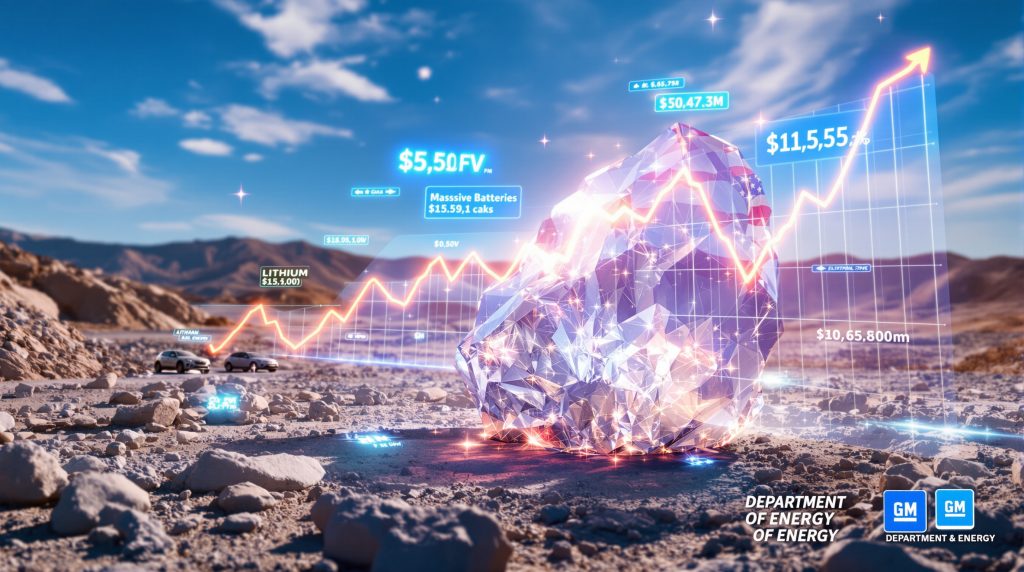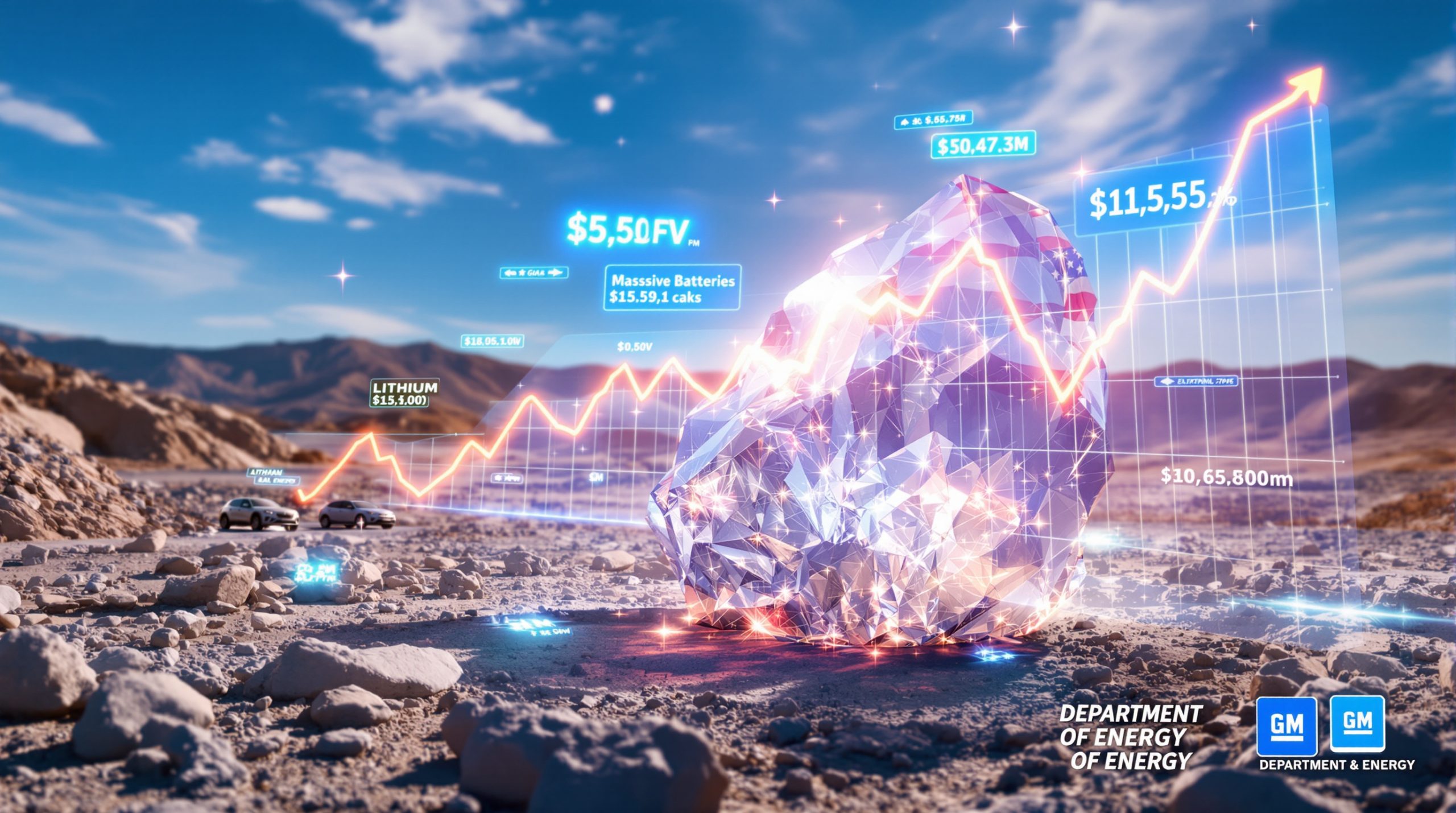U.S. Government Considers Strategic Stake in Lithium Americas: Market Implications
What is Behind Washington's Interest in Lithium Americas?
The U.S. government is exploring the acquisition of up to a 10% stake in Lithium Americas as part of ongoing negotiations related to a $2.26 billion Department of Energy loan for the company's Thacker Pass project in Nevada. This strategic move represents a significant shift in how Washington approaches critical minerals energy transition and reflects growing concerns about economic security in the clean energy transition.
This potential investment comes amid increasing recognition of lithium's strategic importance to national security and economic competitiveness. The federal interest in Thacker Pass demonstrates Washington's commitment to establishing robust domestic supply chains for battery materials that reduce dependence on foreign sources, particularly China.
The Strategic Value of Thacker Pass
Thacker Pass represents a cornerstone in America's mineral security strategy. As the largest planned lithium mine in the Western Hemisphere, the project is positioned to become a critical node in domestic battery supply chains. When operational, the facility is expected to produce approximately 40,000 tons of battery-grade lithium carbonate annually—significantly enhancing domestic production capacity.
The project's scale and strategic location in Nevada make it particularly valuable for building resilient supply chains that connect domestic mineral extraction with downstream battery-grade lithium refinery development. With production targeted to begin in 2028, Thacker Pass represents one of the most advanced lithium development projects in the United States.
How Did the Market React to This News?
Stock Performance Following Announcement
The market's response to the potential government stake was dramatic and immediate. Lithium Americas shares experienced a remarkable surge, jumping nearly 90% in a single trading session following the news. The stock closed at $8.32 after the announcement was made public, representing one of the largest single-day gains in the company's history.
This exceptional performance extended to multiple listings of the company's stock:
- Canadian-listed shares jumped approximately 97% to C$8.37
- U.S.-listed shares increased by similar margins to $6.03
- The company's market capitalization expanded to approximately $1.46 billion following the rally
This substantial market response highlights the perceived value of government backing in an industry characterized by high capital requirements and lengthy development timelines.
Impact on Other Lithium Producers
The positive sentiment generated by the Lithium Americas news rippled throughout the broader lithium sector:
- Albemarle, North America's largest lithium producer, gained 1.85%
- Sigma Lithium, developing lithium projects in Brazil, climbed 7.2%
- SQM, the Chilean lithium giant, saw its U.S.-listed shares rise 1.1%
This sector-wide lift indicates that investors view the potential government stake not merely as company-specific news but as a signal of broader federal support for domestic lithium production. The market reaction suggests investors are reassessing the likelihood of similar government support extending to other lithium industry innovations.
Why is Washington Pursuing Direct Ownership in Critical Minerals?
Shifting National Security Strategy
The potential equity stake in Lithium Americas represents an evolution in U.S. strategic thinking about critical mineral security. Rather than relying solely on tax incentives, grants, or loan guarantees, direct ownership provides Washington with a more substantial position in strategic supply chains.
This approach follows similar strategic investments in other sectors vital to national security:
- The federal government recently moved toward taking a stake in Intel
- The Department of Defense is positioned to become the largest shareholder in rare earths producer MP Materials
- These patterns suggest a systematic approach to addressing vulnerabilities in critical supply chains
This shift in strategy reflects heightened concerns about economic security in an era of technological competition with China. By establishing direct ownership positions, Washington gains greater influence over strategic decision-making while potentially earning returns on invested capital.
Comparative Global Production Context
The strategic importance of domestic lithium development becomes clear when examining global production figures:
| Country | Annual Lithium Production | Global Ranking | Processing Capacity |
|---|---|---|---|
| Australia | Leading producer | 1 | Limited downstream processing |
| Chile | Second largest | 2 | Growing processing capacity |
| China | 40,000+ metric tons | 3 | Processes 75%+ of global supply |
| U.S. | Minimal current production | Outside top 5 | Growing but limited |
China's dominance in lithium processing presents a particular challenge for U.S. supply chain security. Despite ranking third in raw lithium production, China processes more than three-quarters of the world's lithium into battery-grade material—creating a strategic chokepoint in global supply chains.
By developing domestic resources and supporting processing capabilities, Washington aims to reduce this dependency on Chinese refining capacity. The stake in Lithium Americas represents a concrete step toward addressing this structural vulnerability.
What Role Does General Motors Play in This Arrangement?
GM's Existing Investment
General Motors has already established a substantial position in the Thacker Pass project, having invested $625 million in 2024 for a 38% stake. This investment reflects the automaker's strategic focus on securing critical battery materials for its ambitious electric vehicle production plans.
GM's involvement includes several key elements:
- Secured offtake agreements for lithium from the mine
- Rights to purchase all lithium from the first production phase
- Option to acquire a portion of production from the second phase for 20 years
- Strategic partnership with both Lithium Americas and potentially the federal government
This three-way relationship between a private automaker, mining company, and the federal government represents an innovative approach to supply chain development that combines private capital, industrial expertise, and public resources.
Potential New Terms
The potential government stake may introduce new dynamics to the existing arrangement with GM. According to industry sources from Yahoo Finance, current negotiations include:
- Government seeking guarantees that GM will purchase the metal as specified in offtake agreements
- Possible restructuring of existing agreements to accommodate federal participation
- Potential price guarantee mechanisms that could insulate the project against market volatility
- Enhanced coordination between public and private stakeholders
This evolving partnership structure could create a template for future collaborations in critical mineral development. By aligning federal priorities with private sector capabilities, this approach aims to accelerate domestic resource development while ensuring stable demand through secured offtake arrangements.
What Are the Economic Implications of Government Equity Stakes?
Financial Structure Advantages
The government's equity-based approach offers several distinct advantages over traditional support mechanisms:
- Compared to tax increases or direct subsidies, equity investments are often viewed as having lower political costs
- Government participation can enhance project financing terms and improve access to capital
- Equity positions potentially generate returns for taxpayers if projects succeed
- Price guarantees associated with equity stakes can insulate strategic projects against market volatility
Financial analysts have noted that this approach aligns with broader shifts in how governments support strategic industries. Rather than providing one-time grants or tax benefits, equity positions create ongoing relationships that can evolve as projects develop.
Analyst Perspectives
Multiple financial analysts have offered insights on the implications of government equity in critical mineral projects:
-
TD Cowen analysts indicated that government involvement would provide credibility to both project completion and potential expansion, potentially with improved economic terms.
-
NBCFM Research analyst Mohamed Sidibe specifically referenced "the MP Materials-DoD model" as showing "how government equity, long-term offtake, and price support can derisk strategic projects," though noted potential shareholder dilution concerns.
-
Morningstar analyst Seth Goldstein suggested that an equity stake could include offtake price guarantees, potentially making Thacker Pass profitable even if lithium prices remain lower for longer.
-
Jefferies analysts noted that "the administration's preference for equity stakes, viewed as lower political cost than tax increases, can support financing, corporate profits, and favorable returns on invested capital."
These diverse perspectives highlight how government equity participation can fundamentally alter project economics while potentially addressing market failures in critical mineral development.
How Does This Fit Into Broader U.S. Critical Minerals Strategy?
Recent Precedents in Strategic Investments
The potential stake in Lithium Americas follows a pattern of increasing government involvement in critical industries:
- The administration recently moved to take a stake in chipmaker Intel
- The Department of Defense is positioned to become the largest shareholder in rare earths producer MP Materials
- Similar approaches are being considered for other critical mineral projects
This pattern suggests a coordinated strategy rather than ad hoc interventions. By establishing direct positions in companies across the semiconductor, rare earths, and battery materials sectors, Washington appears to be implementing a comprehensive approach to supply chain security.
China's Dominance in the Lithium Supply Chain
The strategic context for these investments lies in China's commanding position in global lithium processing:
- China processes more than 75% of the world's lithium into battery-grade material
- Produces over 40,000 metric tons of raw lithium annually (third-largest producer)
- Controls significant portions of global battery manufacturing capacity
- Has established strategic positions throughout global lithium supply chains
This dominance creates substantial vulnerabilities for U.S. manufacturing, particularly as transportation and energy storage increasingly depend on lithium-ion batteries. By supporting domestic lithium production and processing, Washington aims to reduce these dependencies while creating economic opportunities within the United States.
What Challenges Might This Approach Face?
Implementation Considerations
Despite its potential benefits, the government equity approach faces several implementation challenges:
- Potential shareholder dilution concerns for existing investors
- Complex regulatory approval processes for government investments
- Extended timeline to production (2028 target) creates execution risk
- Balancing government oversight with commercial operational efficiency
These challenges will require careful navigation by both public and private stakeholders. Establishing appropriate governance structures that protect taxpayer interests while enabling commercial flexibility will be particularly important for successful implementation.
Market Uncertainties
Beyond implementation concerns, several market factors could impact the success of government-backed lithium projects:
- Lithium prices have demonstrated significant volatility in recent years, affecting project economics
- Evolving battery chemistries could potentially impact long-term lithium demand
- International competition for lithium resources continues to intensify
- Political sustainability across administrations remains uncertain
These market dynamics create a complex environment for long-term investments in lithium production. Government equity participation may help mitigate some of these risks, but cannot eliminate fundamental market uncertainties.
How Could This Impact the Future of Domestic Lithium Production?
Long-term Strategic Benefits
If successfully implemented, the government stake in Lithium Americas could yield several long-term benefits:
- Creating a template for public-private partnerships in critical minerals development
- Establishing precedent for government involvement that balances security with commercial viability
- Potentially accelerating development timelines for domestic resources through enhanced financing
- Building foundation for vertically integrated battery manufacturing in the United States
The approach could fundamentally reshape how critical mineral projects are developed in the United States. By demonstrating that government equity can support rather than impede commercial development, this model could attract additional investment to the sector.
Production Timeline and Capacity
The Thacker Pass project represents a significant addition to domestic lithium capacity:
- 2028 projected start of operations, with potential for acceleration with government support
- Multi-phase development plan with expansion opportunities
- Potential for expanded capacity based on favorable economics with government backing
- Meaningful contribution to reducing import dependence for battery materials
While a single project cannot eliminate import dependence, Thacker Pass represents an important step toward building resilient domestic supply chains. When combined with other developing projects, it could significantly enhance U.S. lithium production capacity over the coming decade.
FAQ: U.S. Government Stake in Lithium Americas
What percentage stake is the U.S. government considering in Lithium Americas?
The U.S. government is reportedly considering acquiring up to a 10% stake in Lithium Americas as part of negotiations related to a $2.26 billion Department of Energy loan for the Thacker Pass project.
How does this investment approach compare to traditional government support?
Unlike traditional subsidies or tax incentives, direct equity investment provides the government with ownership rights, potential return on investment, and greater influence over strategic decisions while potentially offering more favorable economics for all stakeholders.
What is the significance of the Thacker Pass project to U.S. mineral security?
As the largest planned lithium mine in the Western Hemisphere, Thacker Pass represents a cornerstone in efforts to establish domestic supply chains for electric vehicle batteries and reduce dependence on foreign sources of critical minerals.
How might government involvement affect the project timeline?
While government involvement could potentially accelerate permitting processes and provide financing certainty, complex negotiations and oversight requirements might introduce new complexities to the development timeline.
What precedent does this set for other critical mineral projects?
This approach could establish a model for similar government investments in other strategic mineral projects, potentially creating a pathway for accelerated development of domestic resources across the critical minerals spectrum. Additionally, the approach aligns with recent policy changes, including the executive order on minerals and broader US mineral production order initiatives.
Further Exploration:
Readers interested in learning more about U.S. critical minerals policy and lithium supply chains can also explore related educational content available through the Department of Energy's Critical Materials Institute and the U.S. Geological Survey's mineral resources program.
Ready to Spot the Next Mineral Discovery Opportunity?
Stay ahead of the market with Discovery Alert's proprietary Discovery IQ model, delivering real-time notifications when significant ASX mineral discoveries are announced. Explore how historic discoveries have generated substantial returns by visiting our dedicated discoveries page and start your 30-day free trial today.




